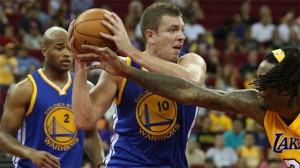 In the interest of full disclosure, I believe in David Lee.
In the interest of full disclosure, I believe in David Lee.
From the time he set foot on the court with the New York Knicks to the day he was traded to the Golden State Warriors to now, when the Warriors are actually, well, competent, I’ve watched him. I’ve watched him put up double-doubles with the snap of his fingers; I’ve watched him remain the same relentless force he’s always been.
But I’ve also bore witness to the criticism he receives for his defense, the absence of a playoff appearance and his $12.8 million salary. And to some extent, it’s all justified. Lee is not a deft defender, he’s never seen the light of the playoffs and despite his production, his lackluster resume screams anything but superstar.
And yet, as I came across Tom Ziller of SB Nation’s piece on Lee’s actual value to Golden State, I couldn’t help but disagree. The stats were there in front of me and his argument was eloquently put, but I couldn’t bring myself to believe he wasn’t a star, to believe he wasn’t worth the money the Warriors were paying him.
Because he is.
I cannot refute much of what Ziller said. He made some great points, none more compelling than the notion of how much of a liability he Lee can be defensively:
By scouting report, Lee is a defensive disaster. His only marketable defensive skill is rebounding, where he’s quite strong. But he has such a poor defensive reputation that when he once received an All-Defense vote the internet nearly imploded in disbelief. On-off data seems to back up the common perception. Last season, the Warriors’ defense was five points per 100 possessions better with Lee on the bench. With Lee on the court, opponents had an effective field goal percentage of .505. With Lee on the bench, it was .478.
The numbers were virtually identical in 2010-11: the Warriors’ defense was five points better with Lee sitting, primarily because of shooting. Using on-off data, Lee’s offensive contribution has been nearly the exact converse of his defensive impact: the team has typically been 4-5 points better offensively with Lee on the court.
Again, these points are rock solid; they’re irrefutable.
But do they tell the whole story? A large chuck of it perhaps, but not the narrative in its entirety.
Though Lee has been considered a defensive liability in the past, Golden State’s defense is now 3.2 points per 100 possessions better with Lee on the floor. Opponents’ effective field-goal percentage is almost identical with him on the court (47.9) and off the court (47.7) as well. So, at least for this season, it would be more than a stretch to consider Lee a defensive liability. Especially when the Warriors’ offense is nearly eight points per 100 possessions better with him on the floor.
That’s huge; it’s all huge.
What’s just as notable is the fact that this is one season. Lee’s performance this season doesn’t change the impact, or lack thereof, he had in Golden State the previous two. Yet those were bad teams; convocations that weren’t even close to contending for the playoffs. Wouldn’t that have affected Lee’s statistical impact?
It’s easy for us to point to other superstars and conclude that they make their impact overwhelmingly evident even on bad teams, yet that’s not always the case.
Take Dwight Howard. The Los Angeles Lakers offense is actually scoring 7.6 points per 100 possessions more with Howard off the floor. Their defense is also allowing nearly two points per 100 possessions with him on the pine as well. Does that mean he’s not a superstar? Does that mean he’s overpriced?
Again, absolutely not. Never before in Howard’s career has his team averaged more points with him off the floor. Never. They have, however, allowed less points with him on the bench three times over the course of his career. And that’s telling—telling of the collective more than anything else.
Superstars are always going to have an impact. Even on bad teams. But that impact won’t always show up in the box score. Plenty of that has to do with the environment they’re in; plenty of that has to do with how well the cast around them defends and scores as well.
I’m not about to consider Howard a poor defender because his teams have allowed less points with him off the floor in the past and I’m not going revoke his star-status because the Lakers are scoring more without him now.
Just like I’m not going to deem Lee overpaid or overrated because he’s played on predominantly struggling teams that have made it so his value doesn’t always show in the stat lines.
While I understand Ziller meant no disrespect and was not diminishing Lee’s abilities by any means, I also understand the point he was ultimately trying to make—Lee isn’t a superstar.
And after much consideration, I have to say that I respectfully disagree.
Dan Favale is a firm believer in the three-pointer as well as the notion that defense doesn’t always win championships. His musings can be found at Bleacherreport.com in addition to TheHoopDoctors.com. Follow @danfavale on Twitter for his latest posts and all things NBA.


















